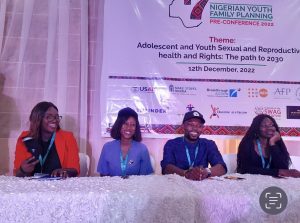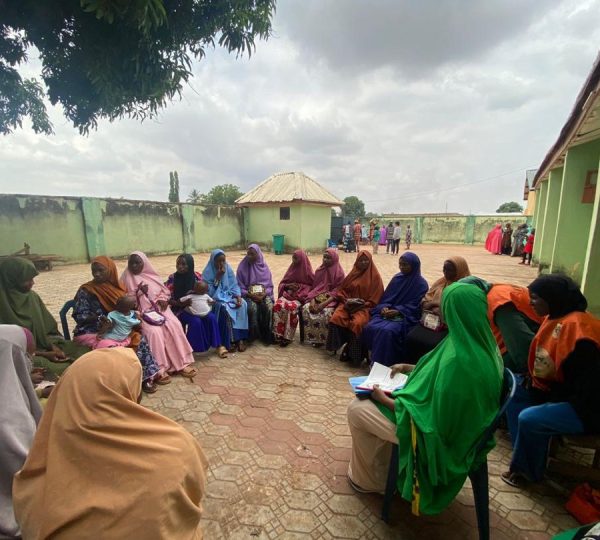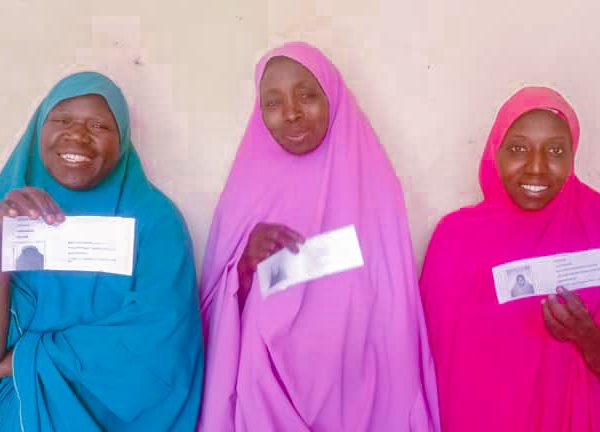The Evolving of Adolescent and Youth Sexual and Reproductive Health and Rights
By Yusuf Hassan Wada
The 7th Nigerian Youth Family Planning Pre-Conference 2022 with the theme; Adolescent and Youth Sexual and Reproductive Health and Rights: The Path to 2030.

Recently, the 2022 Family Planning Market Report was released and it reaffirms the need for the community to learn from the experiences of 2021 and build resilience to unexpected changes in supply chain delivery and the funding landscape. It further explains that the demand for safe, affordable, and quality-assured contraception is only expected to grow in low-and middle-income countries, driving the need for youth-friendly family planning services for young people.
During the 7th National Youth Family Planning Youth Pre-Conference, partners and the government showcased several innovations while discussing programmes, lessons learnt, experiences, as well as challenges and made new commitments in the Adolescent and Youth Sexual and Reproductive Health and Rights (SRHR) programming.
At the heart of this convening, issues were raised around human rights, policy implementation, community ownership, identity, diversity, meaningful engagement, gender equity and resource mobilization. To catch up on SFH’s time at the pre-conference, keep reading.
Integrating FP programs with other health services
Society for Family Health’s youth-led family team discussed their game-changing activities in using digital tech solutions to create access to family planning and contraceptive services amongst adolescents and youth during the NFPC-Pre-Conference Panel discussion in Abuja.
They shared key lessons on how they host live discussions as a consumer-driven approach on WhatsApp group chats, Facebook, and digital companion chatbots known as “Big Sista” and “Tina” which has so far reached 467,546 adolescent girls and women of reproductive age with SHRH and FP knowledge and awareness. In addition, SFH has rendered family planning and contraceptive services to over 187,830 adolescents and young people through some of the RH/FP projects.
They also highlighted how they integrated family planning into other programs, such as HIV testing services, through the Grand Challenges Canada – Adolescent and Young Persons (GCC-AYP) project. This also includes youth empowerment and skill acquisition programmes on the Adolescent 360 Amplify project. We use the MAYE (Meaningful Adolescent and Youth Engagement) strategy to create an enabling environment for young people aged 15-24 years. The goal is to ensure young people champion decision making, and programme design by providing them assets and agency that would help them positively impact their lives and the community.
Refocusing attention: Nothing for young people, without young people
The Stand with a Girl (SWAG) Initiative, Breakthrough Action and Strong Enough Girls (SEGIE) presented how young people are changing narratives in the provision of family planning. The SEGIE – The Indi-Genius Podcast Series seeks to address the ‘knowledge-to-action gap, strengthen the use of information for FP/RH programs, and prevent wasting of resources by documenting and sharing the life experiences of young reproductive health champions in their indigenous communities. It is a multilingual podcast that was created to provide a platform for young indigenous family planning/reproductive health leaders in Nigeria and Niger Republic to share their local knowledge and best practices in Family Planning/Reproductive Health programming through creative oral storytelling.
Shifting From Tokenism to Meaningful Adolescent and Youth Engagement
Educating as a Vaccine (EVA) which was represented by Habiba Ghazali drove the discussion around how well are young people involved in Sexual and Reproductive health programmes. She highlighted the need for meaningful participation of young people without tokenism that involves an inclusive, intentional, mutual-respectful partnership between young people and adults. There were also discussions on making sure that young people are integrated into the designs and delivery of programs, policies, strategies, funding mechanisms and decision-making. Habiba further highlighted also on listening to young persons and promoting people’s centred language that will ensure improved quality and responsiveness of SHRH programmes and policies.
Elizabeth Abayomi from Disability Inclusive Network further discussed amplifying youth-led advocacy efforts, especially in the meaningful engagement of physically challenged persons in the family planning programming with knowledge and awareness so that they can share their unique experiences, in developing and implementing SRHR advocacy initiatives.
Everyone recommits to holding the hand of all young people with the Song “Hold my Hand” by Michael Jackson and Akon.
Young people living with disabilities to lead the way
Marie Stopes’s Rahama Bungudu geared the discussion around “How are innovations working for Young People living with disabilities?’ with lessons learnt from their programming and the launch of their Contact Centre and the Glossary of Sexual and Reproductive Health in Nigeria Sign Language. She highlighted that they have so far shifted from 1% in 2017 to 7% in 2022 on high-impact clients reaching people with disabilities.
Demystifying digital health to improve SRHR
The conference is not sidelined on leveraging digital platforms in increasing access and improving the quality of reproductive health. The EVA and UNFPA team led by Habiba Ghazali provided information on the FRISKY App, a Google play store app that promotes SRH information-seeking behaviour, giving health information with a unique feature that enables assessing sexual health risk. It helps you “Know your bodi”, “Check your bodi”, and “Yarn with us”.
SFH also highlighted how the GCC-AYP is improving healthcare providers’ knowledge, skills, and attitude towards rendering SRHR to AYPs via an online digital platform known as the Medical Learning Hub, managed by Tech care for All. These services include Counselling, STI management, HIV Care, Contraceptive uptake, and others.
Holding Governments Accountable: The National Policy on the Health & Development of Adolescent & Young People in Nigeria
On a panel of stakeholders that entertained questions from the youths present, further advocacy for the Review of the National policy on the health and development of adolescents and young people in Nigeria was sort for to gain the integration of adolescent & youth-friendly services into primary healthcare facilities in Nigeria.
At the Society for Family Health, we know that making access to information and awareness is key to helping achieve access to family planning for all. We’ll be at NFPC with exciting sessions and a booth for everyone to know about us and access cutting-edge and innovative approaches to increasing access to both SHRH and FP information, services, and products. Don’t forget to follow @SFHNigeria on social media for more on-the-ground updates at NFPC.




